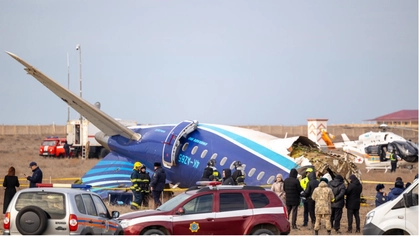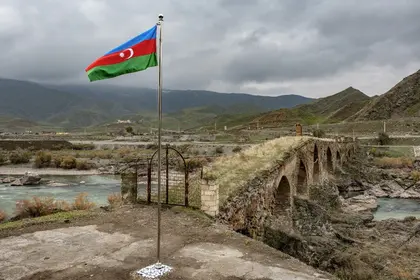“I heard a loud explosion, the oxygen masks fell down and the plane shook,” Rinat Assanov told AFP, recalling the moment the Azerbaijan Airlines plane he was on ran into trouble over southern Russia.
The plane, flying from the Azerbaijani capital of Baku to Grozny in Russia’s Chechnya, crashed hundreds of kilometers (miles) to the east, near the Kazakh city of Aktau, killing 38 of the 67 passengers on board.
JOIN US ON TELEGRAM
Follow our coverage of the war on the @Kyivpost_official.
Azerbaijan has publicly said the plane was shot by Russian air defenses – a theory backed by independent analysts.
Moscow said its air defense systems were operating in the area at the time but has not admitted shooting the plane, triggering a rare diplomat feud with Moscow.
At his home in the Kyrgyz city of Tokmok, survivor Assanov said he has to “lie down all day” and rest his “painful body.”
The 20-year-old computer science student will have to undergo treatment – physiotherapy, some tablets and sessions hooked up to a drip – for another six months.
Doctors have forbidden him from looking at images of the crash site.
One month after the Dec. 25 incident, investigations are still ongoing and the exact circumstances of how the plane was downed have not been officially established.
Baku is openly accusing Moscow of trying to cover up its accidental shoot-down of the plane.
Experts say images of holes in the plane’s fuselage resemble those seen in MH17, the Malaysian Airlines plane shot down in 2014 with an anti-aircraft missile by Russian-backed separatists in eastern Ukraine, killing 298 people.

Armenian Government to Start EU Accession Process as Rift with Moscow Widens
Kazakhstan, an ally of Moscow, on Friday postponed the publication of analysis of data from the plane’s black box until next week.
‘Everybody panicked’
Assanov, who was orphaned as a teenager, was traveling to Russia via Azerbaijan.
Many Kyrgyz citizens head to Russia for work, where they can earn higher salaries and save-up or support families back home.
After an overnight flight from Kyrgyzstan’s capital Bishkek to Baku, he boarded the plane to Grozny, the capital of Russia’s southern Chechnya region.
Exhausted, he fell asleep.
“I was woken up by an explosion. It made such a noise. I saw on the left side of the plane some kind of plastic had broken off and the oxygen masks fell down,” he said.
“Then there was a second sound – five to 10 minutes later. Everybody panicked, people were getting up and walking around, crying. A stewardess told us to calm down.”
The plane then turned east, headed across the Caspian Sea and attempted to land at Aktau.
Why it embarked on the more than 400-kilometer (250-mile) detour is yet to be fully explained.
Moscow claimed it was the pilot’s own choice, even though there were many closer options.
“We flew for another hour and a half or so. The whole time I was hoping the plane would be okay, that we’d land normally,” said Assanov.
‘The earth is getting closer’
After crossing the Caspian Sea, which separates the Caucasus from Central Asia, passengers were told to prepare for an emergency touchdown.
“The flight attendant told us that the plane was going to have to make an emergency landing on land, to prepare for the impact and to get out through the emergency exits,” Assanov recalled.
“We were told how to protect our heads and that we had to sit properly, remove all sharp objects, like watches.”
“Then I realized that the plane was going down somewhere in a field, not towards the airport at all. And I was thinking, ‘Why me? Why this plane? Why now?’”
“I could see the earth coming closer, and I was so scared that I lost consciousness, only waking up in hospital.”
He had been in a coma for three days after the plane crashed in the Kazakh steppe, three kilometers away from the airport.
Once awake, Assanov was transferred to Kyrgyzstan and placed in intensive care.
He refuses to fly for now and has stopped going to the gym but remains optimistic.
“Life goes on, as before. I just found myself in this situation and will have to live with it,” he said.
You can also highlight the text and press Ctrl + Enter










